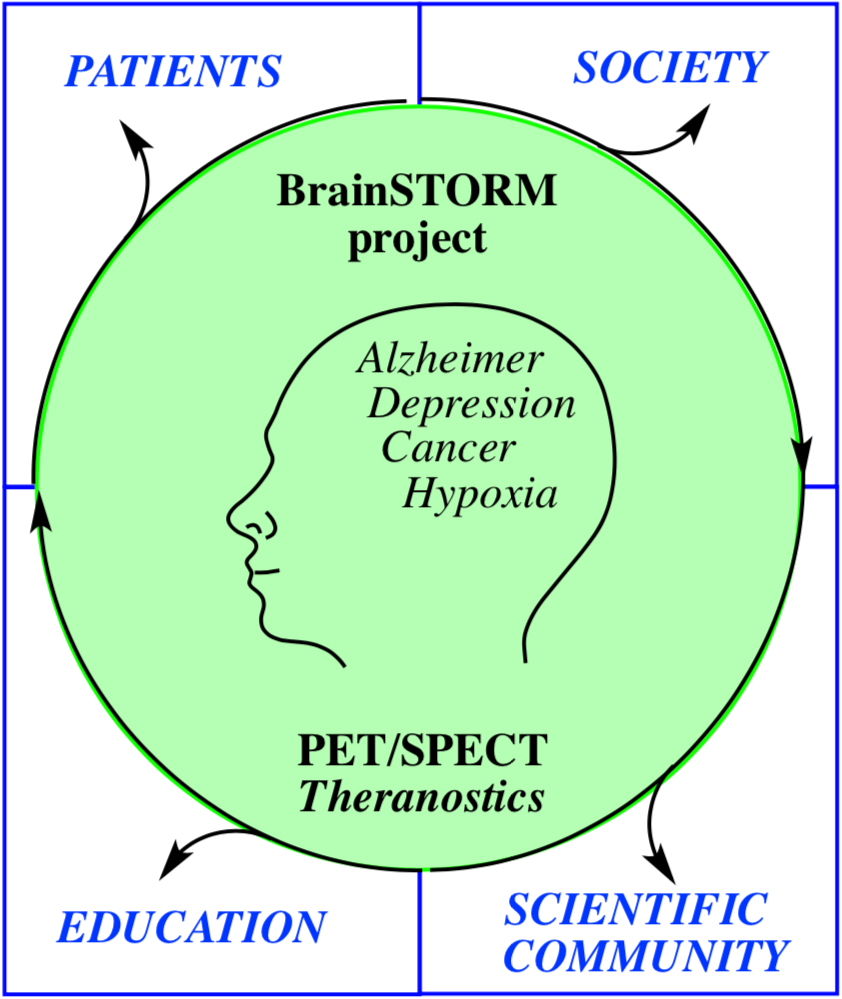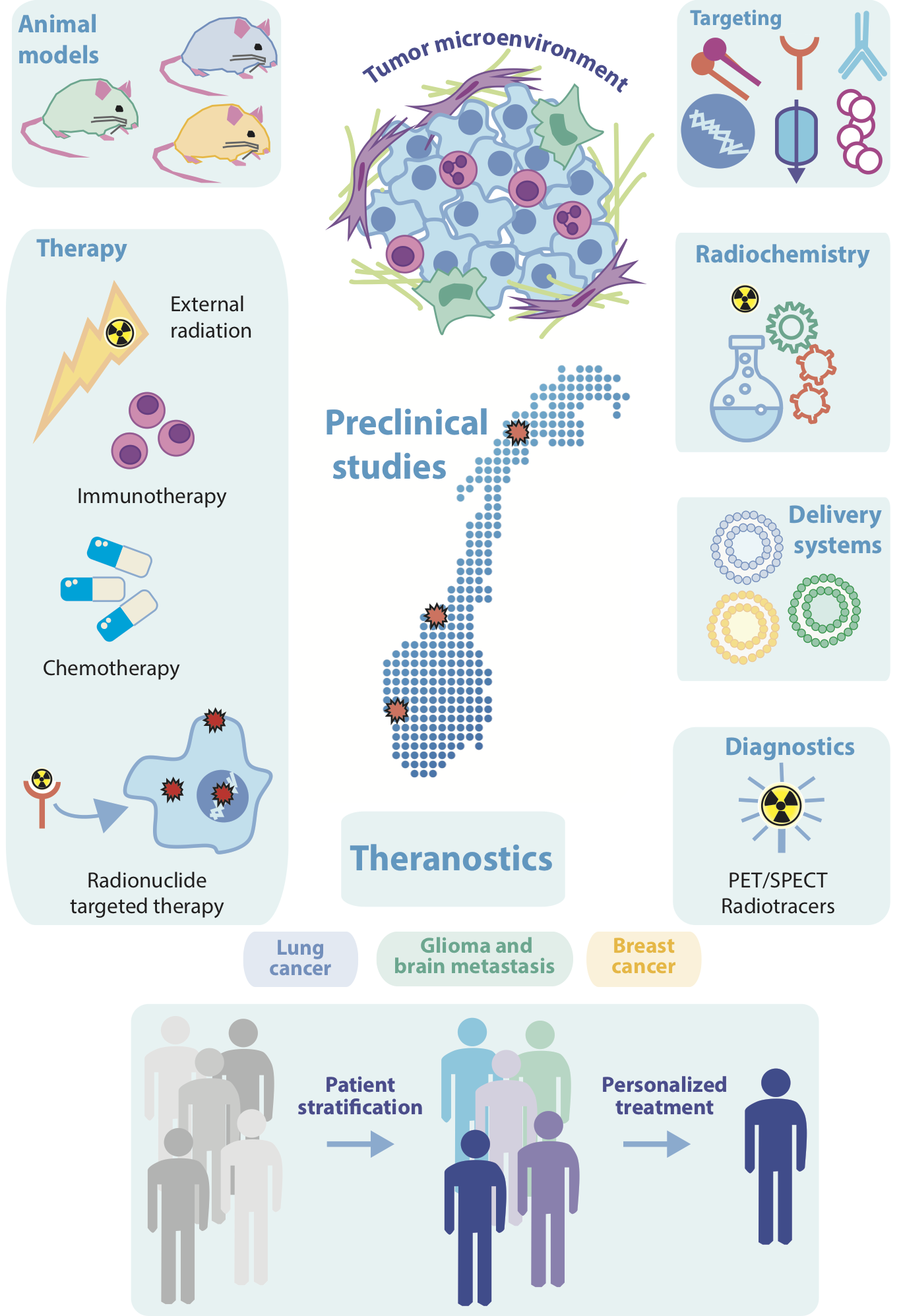Projects
• 180 °N (fka Coastal Cooperation)
• BrainSTORM: PET in Targeted Brain Theranostics and Education
• COST Action - European network of multidisciplinary research to improve the urinary stents (ENIUS)
• SECURE - Novel Marine Resources for Food Security and Food Safety
180 °N
f.k.a. Coastal Cooperation (Kystsamarbeid)
The 180 °N project is a new national research collaboration led by Universities and University Hospitals in Tromsø, Trondheim and Bergen. Stavanger University Hospital also participates as a partner in one of the projects. The 180 °N project aims to develop methods for various cancer diseases and neurological disorders, and to improve patient stratification and personalized treatment. The research program starts in 2019 and will last until 2024.
Towards the collaborative goals, the Bergen project focuses on the development of radioactive tracers, Tromsø on preclinical testing, and Trondheim on clinical trials. A close cooperation network in the fields of tracer development, pharmacology, chemistry, (radiation) oncology, (radiation) biology, nuclear medicine, immunology, drug development and machine learning are established. State-of-the-art imaging diagnostic equipment is also funded by private gifts from Trond Mohn to the University Hospitals in the three cities. This allows method and routine transfer between institutions, and that the projects can reinforce each other with knowledge and data from their focus fields.
For information about the projects and contacts at Bergen and Trondheim please refer to the 180 °N website and the post of Tromsø Research Foundation.
Tromsø project:
Targeting tumor microenvironment
Boosting PET-based diagnostics and therapies
Work packages (WP) of the Coastal Cooperation Tromsø project
WP 1: Immune-PET and lung cancer
PI: Inigo Zubiavrre Martinez and Turid Hellevik
WP 2: Radionuclide targeted therapy and imaging in Glioblastoma
PI: Mathias Kranz and Rune Sundset
WP3: Phagocyte targeting in breast cancer
PI: Sjoerd Hak and Natasa Skalko-Basnet
WP4: Advancing oncological PET imaging using machine learning
PI: Stian Normann Anfinsen and Robert Jenssen
PhD and postdoctoral projects
Please check the 180 oN website.
BrainSTORM: PET in Targeted Brain Theranostics and Education
 Brain theranostics holds tremendous promise for treatment of brain disease, involving design and development of molecular probes for imaging, monitoring and therapy. However, significant challenges remain, such as blood-brain barrier (BBB) permeability, targeted and controlled delivery to specific brain regions as well as early disease diagnosis. The BrainSTORM project aims to address these challenges via multidisciplinary approaches to personalized precision medicine in the areas of Alzheimer ́s disease, depression and brain cancer. The Positron Emission Tomography (PET) Imaging Center in Tromsø opened in 2018 as a state-of-the-art facility for clinical and preclinical PET/CT, PET/MR and SPECT/CT imaging as well as base for the generation of radioactive isotopes and molecules. The co-localization with established UiT research environments in medicine, chemistry, physics, pharmaceutical sciences, biology and science education enable us to develop cutting-edge brain theranostics for personalized precision medicine and an integrated unique educational program. Objectives of the BrainSTORM project include:
Brain theranostics holds tremendous promise for treatment of brain disease, involving design and development of molecular probes for imaging, monitoring and therapy. However, significant challenges remain, such as blood-brain barrier (BBB) permeability, targeted and controlled delivery to specific brain regions as well as early disease diagnosis. The BrainSTORM project aims to address these challenges via multidisciplinary approaches to personalized precision medicine in the areas of Alzheimer ́s disease, depression and brain cancer. The Positron Emission Tomography (PET) Imaging Center in Tromsø opened in 2018 as a state-of-the-art facility for clinical and preclinical PET/CT, PET/MR and SPECT/CT imaging as well as base for the generation of radioactive isotopes and molecules. The co-localization with established UiT research environments in medicine, chemistry, physics, pharmaceutical sciences, biology and science education enable us to develop cutting-edge brain theranostics for personalized precision medicine and an integrated unique educational program. Objectives of the BrainSTORM project include: - Develop PET/SPECT-radiotracers and nanoparticle delivery systems selectively targeting brain receptors central to Alzheimer ́s disease, depression and cancer.
- Apply radiotracer systems to cutting-edge theranostics (therapy and diagnostics) and basic brain function studies on animal models.
- Advance secondary and tertiary education within interdisciplinary science in health technology and its use in research, treatment and diagnosis of brain diseases.
Work packages (WP) of the BrainSTORM project
WP1 : Modelling and in silico screening
PI: Ingebrigt Sylte
WP2: Chemical synthesis and radiolabeling methodology
PI: Jørn Hedløy Hansen
WP3: Nanotheranostics and nanomedicine
PI: Natasa Skalko-Basnet
WP4: Seal brain hypoxia mechanism
PI: Lars Folkow
PhD and postdoctoral projects
Please check back later.
SECURE - Novel Marine Resources for Food Security and Food Safety
To develop knowledge enabling sustainable food security and safety by a multidisciplinary approach based on novel marine low trophic level resources, cardiometabolic health and legal framework.
The novel low-trophic Arctic raw materials selected for this project include microalgae, calanus and sea cucumber, all novel resources with emerging industries. Several interdisciplinary work packages (WP) will conduct research on the legal framework regarding harvesting of new species, composition of nutrients and contaminants in these raw materials, their effects on the oral and gut microbiome, on cardiometabolic diseases and atherosclerosis and the link between gut microbiota and atherosclerosis. PET imaging will provide an important novel non-invasive tool to study the development of atherosclerotic plaque and enhance the accuracy of atherosclerotic lesion characterization. The knowledge will be ranked against traditional seafood items to enable targeted dietary advice. A stakeholder from the industry will also provide knowledge and experience with regulations and contribute with feedback throughout the project.
This project is funded by UiT Tematiske Satsninger. The Work Package 2.1 "Small animal radionuclide preclinical imaging in atherosclerosis" is led by Assoc. Prof. Rune Sundset and Assoc. Prof. Karl-Erik Eilertsen.
Page administrator: Yu-Fen Chang
| Contact Group Leader Rune Sundset, Assoc. Prof., MD, PhD |
| Visit us Hansine Hansens veg 82, Tromsø UiT The Arctic University of Norway Colocated with PET Imaging Center The University Hospital of North Norway (UNN) |
| Mailing address Nuclear Medicine and Radiation Biology Research Group Department of Clinical Medicine Faculty of Health Sciences UiT The Arctic University of Norway 9037 Tromsø Norway |

